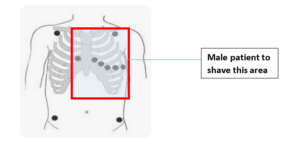Electrocardiography Stress Test (EST) or Treadmill Test – What is it?
The Electrocardiography Stress Test (EST) or Treadmill Test is a procedure to assess your heart’s response to the increased workload and demand for blood during exercise. This is done by recording the electrocardiography (ECG) while walking or running on a treadmill.
Why is it done?
Your doctor may order this test for you to assess your cardiac health and whether there are any concerns of coronary heart disease. The test is helpful in diagnosing ischaemic heart disease, i.e., reduced blood supply to the heart muscles from the coronary arteries.
Is the test safe?
The test is generally very safe and has a very low risk of complications. Falls, head injuries, chest pain, and asthma exacerbation are some of the likely side effects.
How is the test done?
Although the appointment lasts about 60 minutes, the exercise time is usually between 7 and 12 minutes.
A doctor will review you before the treadmill test to ascertain your health condition has not changed from the pre-assessment check-up.
The nurse will gently clean and, if necessary, shave several small areas on your chest and place small, flat, sticky patches called electrodes on them. They’ll be attached to an electrocardiogram monitor -that charts your heart’s electrical activity during the test. You will also have a blood pressure cuff placed on your arm.
Before exercising, the nurse will perform an ECG to measure your resting heart rate. They will also take your resting blood pressure.
Once ready, you will be asked to walk on a treadmill. The treadmill’s speed and gradient (steepness) will be increased every few minutes. The test will be stopped if you develop severe fatigue, breathlessness, tired legs or chest pain. If you feel unwell during the test, you must tell the nurse immediately.
The nurse will monitor your pulse, blood pressure, and ECG throughout the treadmill test. It’s normal for your heart rate, blood pressure, breathing rate, and perspiration to increase during the test. If the nurse/doctor is concerned about any changes observed on the ECG and blood pressure readings during the test, the procedure will be stopped early.
At regular intervals, you will be asked how you are feeling. Tell the nurse/doctor if you feel:
- Chest or arm discomfort
- Short of breath
- Dizzy
- Lightheaded
- Any other unusual symptoms
After the test, you’ll walk for a minute to cool down. Your heart rate, blood pressure, and ECG will continue to be monitored until the levels return to regular readings.
What should I wear?
Please wear light, comfortable clothing and shoes suitable for walking for your treadmill test. Wear a shirt that can be easily removed to facilitate the placement of electrodes on the chest. Men usually don’t wear a shirt during the test; women generally wear a bra, lightweight blouse, or hospital gown.
Avoid emollients or lotions on the test day as they interfere with the electrode-skin contact.
What do I need to prepare for the test?
- Refrain from ingesting food, alcohol, caffeine or using tobacco products within 3 hours of testing.
- Avoid significant exertion or exercise on the day of assessment before the stress test.
- Male patients are reminded to shave the chest hair at the centre and left side of the chest (please see diagram below) and to shave the day before the treadmill test.
- Patients should wear clothing that allows freedom of movement.
- If the stress test is for diagnosis in a patient without prior ischemic heart disease and the patient is on beta-blockers, the beta blockers should be stopped 24-48 hours before the stress test.
- If you have asthma or chronic obstructive pulmonary disease, please bring your inhalers.
What can I expect after the procedure?
You will be monitored after the stress test to ensure that your heart rate and blood pressure return to regular readings before we can discharge you from our care.
We have a shower facility if you would like to shower before leaving the clinic. In this case, please bring a set of clothing to change.
If you still do not feel well after the test, the clinic will arrange to send you to Accident & Emergency or/and be seen by a cardiologist.
Your doctor will inform you of your test outcome when we receive your report. If the test is abnormal, your doctor will discuss a treatment plan with you and may refer you to a cardiologist for further management.




































